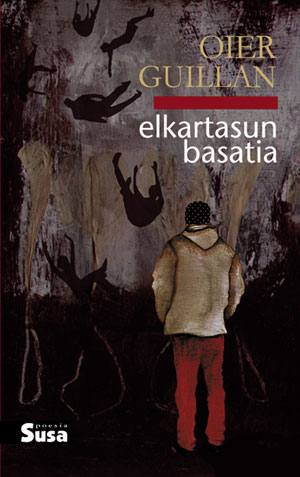
Lilia Brik and the Zapatistas
- Oier in Guilla: Savage solidarity Susa, 2013
Igor Estankona
2013ko maiatzaren 08a

Ufa, Oier clings so strongly to the book that tears and rabies mix in my blood. Of course, that first poem, a song is almost, sensible and rounded; it places us as Benito in the world, it defines Otamendi as a nation, our Liberia, that moves away.
But this time Guillan has moved us in his own way, not with anyone's speech. She has dedicated herself to this while leaving aside the prosaic. I've heard the crunch of the tablated under Oier's feet -- "The Theater can be a way to be saved" -- and I've heard the music of the bafles -- Bafles, Beti mugan, Silvio -- and the book has left me as before, but much better: “All things that deserve to be loved / I loved them./ I have disappeared from them./ But my nose is still red.” Wild solidarity is richer,
more contradictory, more crude than the roots of the hands (Susa, 2009). Starting with the title, blind forces are led by a much more poetic writer, as if in the end it had become a form of that complex framework of aesthetic and political effort. It does this by using a thin epic and a less heavy apology from the loser. Somehow the dreams we abandon become green and become beautifully transformed: “And you accept that these are the best times.” That optimism is compromise.
And time has a big role to play. Sometimes you can easily know the youth of the poet and review the desire and impotence of those born in the 1970s. On other occasions, inspiration and momentum are abrupt and do not have a gram of nostalgia. Combining slowly, very close, yesterday and now gets a picture of the healthy and real life, half half-disappointed dreamer: “We are not masters of a biography/ written by anyone, but of the thirst of the gap/ of the same age of all legs,/ of doing jobs that few will be able to understand when we take jobs/ in this tortuous circus of militancy.” Savage solidarity has to do with morality.
It's about the morale of the anti-hero, let's say. Guillano, however, has dignified this ethic, brought it out of controversy, sought adjectives. Instead of putting poetry at the service of a conception of the world, it has turned it into a poetic field. So even if I read it in a few years' time, I'm convinced that your music, the sound of the drum, is going to survive events.
But this time Guillan has moved us in his own way, not with anyone's speech. She has dedicated herself to this while leaving aside the prosaic. I've heard the crunch of the tablated under Oier's feet -- "The Theater can be a way to be saved" -- and I've heard the music of the bafles -- Bafles, Beti mugan, Silvio -- and the book has left me as before, but much better: “All things that deserve to be loved / I loved them./ I have disappeared from them./ But my nose is still red.” Wild solidarity is richer,
more contradictory, more crude than the roots of the hands (Susa, 2009). Starting with the title, blind forces are led by a much more poetic writer, as if in the end it had become a form of that complex framework of aesthetic and political effort. It does this by using a thin epic and a less heavy apology from the loser. Somehow the dreams we abandon become green and become beautifully transformed: “And you accept that these are the best times.” That optimism is compromise.
And time has a big role to play. Sometimes you can easily know the youth of the poet and review the desire and impotence of those born in the 1970s. On other occasions, inspiration and momentum are abrupt and do not have a gram of nostalgia. Combining slowly, very close, yesterday and now gets a picture of the healthy and real life, half half-disappointed dreamer: “We are not masters of a biography/ written by anyone, but of the thirst of the gap/ of the same age of all legs,/ of doing jobs that few will be able to understand when we take jobs/ in this tortuous circus of militancy.” Savage solidarity has to do with morality.
It's about the morale of the anti-hero, let's say. Guillano, however, has dignified this ethic, brought it out of controversy, sought adjectives. Instead of putting poetry at the service of a conception of the world, it has turned it into a poetic field. So even if I read it in a few years' time, I'm convinced that your music, the sound of the drum, is going to survive events.